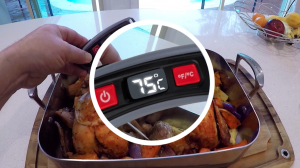 The Food Safety Information Council, and Tonic Health Media, today launched their Christmas entertaining advice to urge consumers to buy a meat thermometer so they can avoid a bout of food poisoning this summer.
The Food Safety Information Council, and Tonic Health Media, today launched their Christmas entertaining advice to urge consumers to buy a meat thermometer so they can avoid a bout of food poisoning this summer.
Council Chair, Rachelle Williams, said Christmas can be a recipe for disaster as we prepare fancy dishes we haven’t cooked before, overload our fridges in the heat and serve food to elderly, young and pregnant friends and relatives.
‘We know from our latest research that only 25% of Australian households own a meat thermometer and even fewer report using one in the previous month. You can’t tell if riskier foods like the Christmas turkey or rolled roasts are cooked to 75°C just by looking, you really need a meat thermometer.
‘If you already have a meat thermometer, rummage through that kitchen drawer and start to use it. If you don’t have one why not pick one up from your local home ware shop or hardware store while you are out Christmas shopping (and don’t forget a fridge thermometer too while you’re there). Thermometers don’t have to be expensive with some costing under $20 so they can make great presents too.
‘Then follow these simple food safety tips for Christmas and Summer entertaining:
- Plan ahead and don’t buy too much food that you can’t fit into your fridge. Overstocking your fridge can affect the temperature and this will help to reduce food waste too.
- Make room in your fridge by removing alcohol and soft drinks and put them on ice in a container or laundry sink. This also stops guests opening the fridge and helps to maintain the temperature at 5°C or below. Use a fridge thermometer to check the temperature.
- Think about getting a turkey breast or a turkey buffé that is simpler to cook than a whole turkey. If you do need a whole turkey ask your supplier if they can defrost it in their cool room ready for you to pick up. Otherwise it must be defrosted in your fridge which can take several days.
- Don’t wash any poultry before cooking as that will spread the bacteria around your kitchen. Cook the turkey until a meat thermometer shows it has reached 75° C in the thickest part of the thigh and cook any stuffing separately as it might not fully cook inside a whole turkey.
- Cooked egg dishes are simple and nutritious but try to avoid raw or minimally cooked egg dishes, such as raw egg mayonnaise or aioli, egg nog or fancy desserts, which can be a particular risk for food poisoning
- Christmas ham won’t last forever – check the storage instructions and best before or use by date before removing the ham from its plastic wrap, cover it with clean cloth soaked in water and vinegar so it doesn’t dry out, and store it in the fridge below 5°C. It is important to remember that the use by date on the original packaging won’t apply after the packaging has been removed, so check the fine print and see if the ham has a suggested shelf life after opening. Reduced salt hams are now becoming popular but will not last as long as conventional hams so think how much you are going to use in the next week or so and freeze some for later.
- Don’t leave dips and other perishable chilled foods like patés, cold meats, cold poultry, sushi and salads out for more than two hours. Put out small amounts and replace (not top them up) from the fridge.
- Refrigerate leftovers as soon as possible. If perishable foods and leftovers have been left out of the fridge for less than two hours they should be okay to refrigerate or freeze to eat later, but food that has been unrefrigerated for more than four hours may not be be safe and should be thrown Always reheat leftovers to 75°C in the centre of the item or the thickest part to kill any food poisoning bugs.
- Don’t forget the most important message of all, is to wash your hands in warm soapy water before preparing and cooking food, and after handling eggs, raw meat, particularly poultry, burgers and sausages.
The Food Safety Information Council would particularly like to thank Tonic Health Media for their support. They are Australia’s largest health and wellness network and will be broadcast our important food safety messages in 4500+ GP practices, hospitals, pharmacies and health centre waiting areas across the country to an an audience of 14 million+ per month see their website for more info.
Test you knowledge with our Christmas and holiday entertaining quiz
For more information see our Food Safety at Christmas advice
Media contact:
Lydia Buchtmann, Food Safety Information Council, 0407 626 688 or info@foodsafety.asn.au
The Food Safety Information Council is a health promotion charity which aims to address the estimated 4.1 million cases of food poisoning in Australia each year that result in 31,920 hospitalisations, 86 deaths and 1 million visits to doctors.
